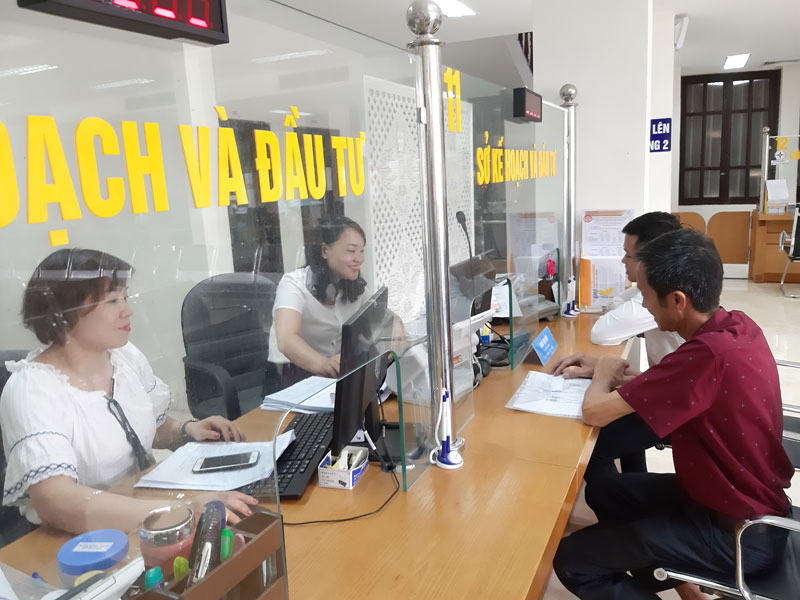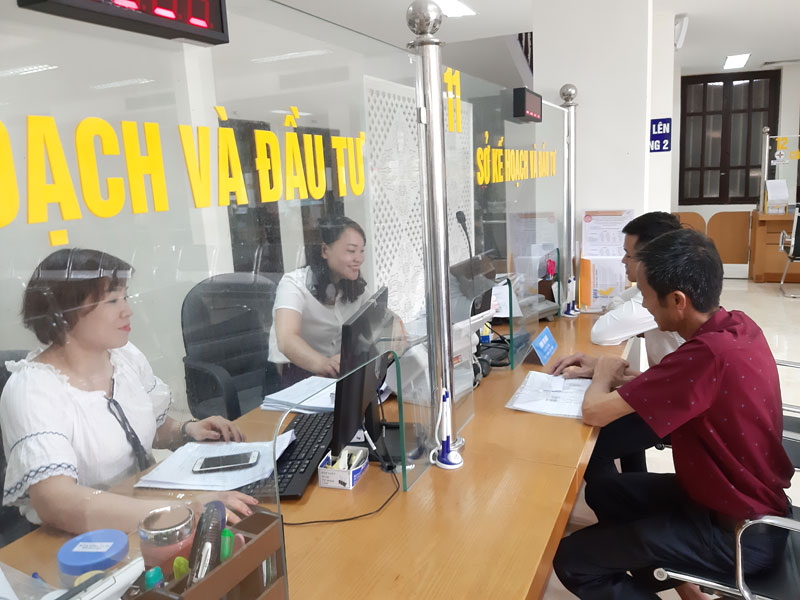
(HBO) - The Hoa Binh provincial People’s Committee is ordering solutions to be carried out drastically to reduce unofficial costs for businesses and strictly deal with the bureaucracy caused by some officials and civil servants.

The provincial People’s
Committee is ordering administrative reforms be stepped up to support
businesses and people. Photo: The province’s administrative service centre
provides favourable conditions for organisations and individuals to handle
procedures.
Deputy Chief Inspector of the Hoa Binh
Inspectorate Pham Tien Dung said under the provincial administration’s order
for solutions to improve the provincial competitiveness index (PCI), the
provincial inspectorate has based on ministries and central agencies’
inspection schedules to build its inspection plan and instructed departments,
sectors and local authorities to make their own ones so as to avoid inspection
overlapping.
Inspectorates of departments and sectors have
worked together to ensure that each business is inspected once a year at the
maximum, he said, noting that inspection duration has been ensured to be in
line with the 2010 Law on Inspection.
In particular, inspections conducted by the
provincial inspectorate have lasted for no more than 45 days, and no more than
70 days in complicated cases. Inspections by departments, sectors and
districts’ inspectorates have lasted for no more than 30 days, and no more than
45 days in complicated cases.
To continue helping with the PCI improvement,
the provincial inspectorate and the Hoa Binh business association inked a
document on coordination in sharing information, making complaints and
denunciations, and fighting corruption.
Under the direction of the provincial People’s
Committee’s chairperson, the provincial inspectorate launched a hotline,
02183.822609, based at the anti-corruption inspection division to receive
people and businesses’ feedback on the settlement of administrative procedures,
Dung added.
An e-mail for the work was also set up,
duongdaynong.ttt@hoabinh.gov.vn. Opinions can also be sent to the provincial
inspectorate’s headquarters at No.
170 Thinh Lang street of Hoa Binh city./.
According to data from the Hoa Binh Provincial Party Committee, the industrial production index for the first six months of 2025 is estimated to have increased by 20% compared to the same period last year. This marks the highest year-on-year growth rate for this period since 2020.
In the first six months of 2025, Hoa Binh province’s export turnover was estimated at 1.145 billion USD, marking an 18.11% increase compared to the same period in 2024. Import turnover was estimated at $ 804 million, a 17.15% increase, which helped the province maintain a positive trade balance.
The lives of the ethnic minority farmers in Tan Lac district have gradually improved thanks to the new directions in agricultural production. This is a testament to the collective strength fostered through the professional associations and groups implemented by various levels of the district’s Farmers’ Union.
With the motto the "product quality comes first,” after nearly one year of establishment and operation, Muong village’s Clean Food Agricultural and Commercial Cooperative, located in Cau Hamlet, Hung Son Commune (Kim Boi district), has launched reputable, high-quality agricultural products to the market that are well-received by consumers. The products such as Muong village’s pork sausage, salt-cured chicken, and salt-cured pork hocks have gradually carved out a place in the market and they are on the path to obtaining the OCOP certification.
In the past, the phrase "bumper harvest, rock-bottom prices" was a familiar refrain for Vietnamese farmers engaged in fragmented, small-scale agriculture. But today, a new spirit is emerging across rural areas of Hoa Binh province - one of collaboration, organisation, and collective economic models that provide a stable foundation for production.
Maintaining growing area codes and packing facility codes in accordance with regulations is a mandatory requirement for agricultural products to be eligible for export. Recently, the Department of Agriculture and Environment of Hoa Binh province has intensified technical supervision of designated farming areas and packing facilities to safeguard the "green passport" that enables its products to access international markets.



